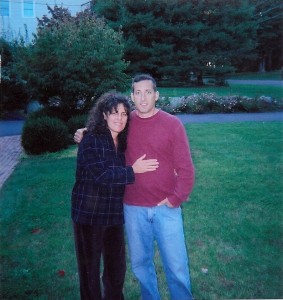Because of the nature of this rare cancer, my entire liver was not affected, and therefore my MELD score – the criteria by which priority for liver transplantation is determined – was low. That meant I was unlikely to receive an organ from the national organ waitlist any time soon. Yet ironically, waiting meant that the cancer could spread beyond the liver, which would disqualify me from eligibility for transplantation.
 |
Sharon Lupo with her brother, Mark Miller
|
After the third of the chemotherapy injections, my liver suddenly began to fail. I was in excruciating pain, I couldn’t eat, and I was losing weight.
My brother, Mark, called after learning of my situation. Having been out of touch with him for some time, I was utterly floored that he wanted to donate part of his liver.
The surgeries occurred in October.
“The first few days after the operation were the most difficult of the recovery,” Mark says; noting he was well enough to leave the hospital; only a month later, he was back to work.
Mark attributes the speed of his recovery to the fact that he was fully at peace with his decision to donate. To future donors, he advises preparing oneself both physically and psychologically for the surgery. Being mentally comfortable with the decision, he says, will make the surgery easier to undergo, and the recovery much smoother.
My recovery took longer, but today I am cancer-free, back at work, enjoying my family, and very grateful to be alive.
This taught me to live in the moment and enjoy every day. I am completely grateful to Mark for saving my life. It takes a really special, selfless person to do what he did.
No comments:
Post a Comment